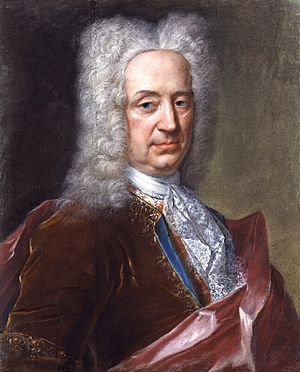Charles Whitworth, 1st Baron Whitworth facts for kids
Charles Whitworth, 1st Baron Whitworth (born October 14, 1675 – died October 23, 1725) was an important English noble, politician, and diplomat. A diplomat is someone who represents their country in another country. Charles Whitworth served as the British ambassador to Russia from 1707 to 1712. An ambassador is the highest-ranking diplomat.
Contents
Early Life and Education
Charles Whitworth was likely born in a place called Blore Pipe, near Eccleshall in Staffordshire, England. He started attending Westminster School in 1690 as a special student called a Queen's Scholar. Later, in 1694, he went to Trinity College, Cambridge. He finished his first degree in 1699 and became a Fellow (a kind of academic staff member) the next year.
Becoming a Diplomat
Whitworth began his career in diplomacy in 1700. He worked as a secretary for George Stepney, who was the British envoy (another type of diplomat) in Berlin. In November 1701, he was chosen to be a British helper to Cardinal Lamberg. Lamberg was a main representative for the Holy Roman Emperor at a big meeting in Regensburg. Whitworth also filled in for Stepney in Vienna when Stepney was away from the embassy there. An embassy is the official office of a country's ambassador in a foreign land.
Ambassador to Russia
In 1704, Charles Whitworth was appointed as the Ambassador Extraordinary to Russia. This was a very important role. His first job was to fix problems with the Russia Company. This company had not managed its tobacco business well, even though it had a special agreement (a monopoly) to sell tobacco in Russia since 1698. A monopoly means one company has total control over selling a product.
Whitworth successfully sorted out the tobacco business between 1707 and 1711. However, he could not get a wider trade agreement signed. He also had to deal with a tricky situation in 1708. The Russian emperor's representative, Andrey Matveyev, was arrested in London because of debt. This made the Russians very upset. Whitworth had to handle this carefully to avoid bigger problems.
He stayed officially in Russia until 1712. But he often traveled for other diplomatic tasks in Eastern Europe. Queen Anne, the ruler of Britain, asked him to find out about Russia's high-level plans. He watched public events closely and noticed how powerful different leaders were becoming. He made friends with important people at the Russian royal court and with foreigners working in Russia. These people gave him secret information about Russia's plans and leaders. He wrote down everything in code and sent it to London.
Whitworth wrote a book called Account of Russia as it was in the Year 1710. Even though it was not published until 1758, this book greatly shaped how Britain viewed Russia for many years.
Later Diplomatic Roles
In December 1713, Whitworth was chosen to be one of the representatives to discuss a trade agreement with France. This agreement was part of the Treaty of Utrecht. In April 1714, he was sent to Augsburg to watch talks between the emperor and France. These talks were happening in Baden that summer. After this, he became the British minister (another type of diplomat) to the Eternal Imperial Diet in Regensburg. The Diet was a big meeting of representatives from different parts of the Holy Roman Empire.
In August 1716, he was appointed as an envoy to Berlin. But he was also sent to The Hague. His mission there was to convince the Netherlands to follow Britain's ban on trade with Sweden. This ban was called an embargo.
Later Life and Death
Whitworth returned to Berlin in 1719. The next year, he married the Comtesse de Vaulgremont. She was the daughter of a government official from a French-speaking area called Flanders.
In 1721, he was given a special noble title in Ireland. He became Baron Whitworth, of Galway. A baron is a type of noble, and this title made him part of the Irish peerage (the group of nobles). In 1722, he became a Member of Parliament for Newport, Isle of Wight.
Charles Whitworth died in 1725 without any children. Because he had no children, his noble title (his barony) ended when he died. He was buried at Westminster Abbey in London. His grave is in the South choir aisle.
 | William Lucy |
 | Charles Hayes |
 | Cleveland Robinson |


